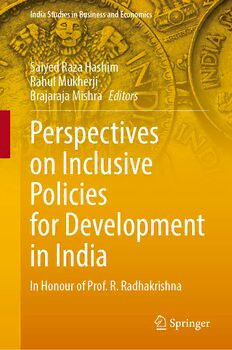Table Of ContentIndia Studies in Business and Economics
Saiyed Raza Hashim
Rahul Mukherji
Brajaraja Mishra Editors
Perspectives
on Inclusive
Policies
for Development
in India
In Honour of Prof. R. Radhakrishna
India Studies in Business and Economics
The Indian economy is one of the fastest growing economies of the world with
India being an important G-20 member. Ever since the Indian economy made its
presence felt on the global platform, the research community is now even more
interested in studying and analyzing what India has to offer. This series aims to
bringforththelateststudiesandresearchaboutIndiafromtheareasofeconomics,
business, and management science, with strong social science linkages. The titles
featured in this series present rigorous empirical research, often accompanied by
policy recommendations, evoke and evaluate various aspects of the economy and
the business and management landscape in India, with a special focus on India’s
relationship with the world in terms of business and trade. The series also tracks
researchonIndia’spositiononsocialissues,onhealth,onpolitics,onagriculture,on
rights,andmanysuchtopicswhichdirectlyorindirectlyaffectsustainablegrowth
ofthecountry.
ReviewProcess
Theproposalforeachvolumeundergoesatleasttwodoubleblindpeerreviewwhere
adetailedconceptnotealongwithextendedchapterabstractsandasamplechapter
is peer reviewed by experienced academics. The reviews can be more detailed if
recommendedbyreviewers.
EthicalCompliance
The series follows the Ethics Statement found in the Springer standard guidelines
here. https://www.springer.com/us/authors-editors/journal-author/journal-author-
helpdesk/before-you-start/before-you-start/1330#c14214
Moreinformationaboutthisseriesathttps://link.springer.com/bookseries/11234
· ·
Saiyed Raza Hashim Rahul Mukherji
Brajaraja Mishra
Editors
Perspectives on Inclusive
Policies for Development
in India
In Honour of Prof. R. Radhakrishna
Editors
SaiyedRazaHashim RahulMukherji
InstituteforHumanDevelopment SouthAsiaInstitute(SAI)
NewDelhi,Delhi,India HeidelbergUniversity
Heidelberg,Baden-Württemberg,Germany
BrajarajaMishra
ICFAIBusinessSchool
Hyderabad,Telangana,India
ISSN 2198-0012 ISSN 2198-0020 (electronic)
IndiaStudiesinBusinessandEconomics
ISBN 978-981-19-0184-3 ISBN 978-981-19-0185-0 (eBook)
https://doi.org/10.1007/978-981-19-0185-0
©TheEditor(s)(ifapplicable)andTheAuthor(s),underexclusivelicensetoSpringerNature
SingaporePteLtd.2022
Thisworkissubjecttocopyright.AllrightsaresolelyandexclusivelylicensedbythePublisher,whether
thewholeorpartofthematerialisconcerned,specificallytherightsoftranslation,reprinting,reuse
ofillustrations,recitation,broadcasting,reproductiononmicrofilmsorinanyotherphysicalway,and
transmissionorinformationstorageandretrieval,electronicadaptation,computersoftware,orbysimilar
ordissimilarmethodologynowknownorhereafterdeveloped.
Theuseofgeneraldescriptivenames,registerednames,trademarks,servicemarks,etc.inthispublication
doesnotimply,evenintheabsenceofaspecificstatement,thatsuchnamesareexemptfromtherelevant
protectivelawsandregulationsandthereforefreeforgeneraluse.
Thepublisher,theauthors,andtheeditorsaresafetoassumethattheadviceandinformationinthisbook
arebelievedtobetrueandaccurateatthedateofpublication.Neitherthepublishernortheauthorsor
theeditorsgiveawarranty,expressedorimplied,withrespecttothematerialcontainedhereinorforany
errorsoromissionsthatmayhavebeenmade.Thepublisherremainsneutralwithregardtojurisdictional
claimsinpublishedmapsandinstitutionalaffiliations.
ThisSpringerimprintispublishedbytheregisteredcompanySpringerNatureSingaporePteLtd.
The registered company address is: 152 Beach Road, #21-01/04 Gateway East, Singapore 189721,
Singapore
(1942–2022)
Thebookisdedicatedtothelifeand
achievementsofProf.R.Radhakrishnawho
sadlypassedawaybeforeitcouldbe
presentedtohim.
Foreword
ThisvolumeinhonourofR.Radhakrishnaconsistsofimportantessays.Mostofthem
areextensivelyrevisedversionsofpreviouspapers,showingthatRadhakrishnaisnot
afly-by-nightoperatorandhisinterestsaredeep-rootedinlifelongcogitation,where
genuineadvanceisincremental.Ifnot,therewouldbenoproblemsremainingsince
solutionsdonotneedelaborationaftertotalsuccess,apartfromintextbooks.Also,
thesearedifficulttimesandmanyauthorsreflectonthepresentproblems,givingthe
volumerelevanceinthe‘annushorribilis’astheQueenofEnglandputit.
C. Rangarajan and Mahendra Dev write on the Rangarajan Committee Poverty
Report. It is in a sense the latest in the official reports on Radhakrishna’s lifelong
interest:namelypovertyandmalnutrition.InspiteofC.Rangarajan’svaliantefforts,
thereportdidnotinterestGoIpolicy-makers,whichisdifficulttounderstand,since
fromallaccountspovertyandmalnutritionremainseriousproblemsandinasense
werehighlightedintheforcedmigrationsinearly2020.Infact,thecryoffreegrain
isverycompellingnow(seeIIMAAlumnusWebinar,COVID-19,introductionby
Y.K.AlaghandalsoE-Adda,29October2020,UdayKotak).Thechapteraddson
socialandhealthsecuritytonutritionsecurityasanobjective.Ithasbeensuggested
that the workforce weights it uses are in fact from the 1978 Poverty Report for
rurallabourforceproportionsandthatmayneedre-examination,sincesuchpropor-
tionshavechangedmarkedlysincetheseventiesofthelastcentury.Femalelabour
participationhasbeen highlighted asamajorsourceofconcern inRadhakrishna’s
work.
Former Governor, Reserve Bank of India, Duvvuri Subbarao mentioned about
laments treasury dominance of fiscal and monetary policy. The trend he correctly
statesismorepronouncedintheCOVID-19period.Hisessaybringsoutneatlythe
trilemmasineconomicpolicyasoneapproachesfullemployment,andwillinterest
policy-makers.Duringpandemicperiod,thisauthorhasacceptedfiscalprofligacyas
afact.Savinglivesisimportant,andthedeadwillnotcomeback,whilethosewho
arealivecanbetakencareofafterthepandemicsubsides(seethepresentauthor’s
InauguralLectureattheIIMPublicPolicyGroup’sWebinaronCOVID).Thereisof
coursenoquestionthatthisisasecond-bestsolution:Dr.Subbarao’sadvicebeing
‘optimal’.
vii
viii Foreword
DilipNachaneandParthaRaytracethehistoryofthemodellingreportedlyused
in the IMF, beginning with Pollack’s Flow of Funds Framework and getting into
thelaterprogrammingmodels.Whiletheearlier,Pollackmodelshadanaccounting
framework of integration with National Accounts and were a policy tool of some
powerintermsofapplicability;latergeneralequilibriumpolicymodelsgavesolu-
tionsofadirectionalkindandNachaneandRay,bringouttheinabilityoftheIMF
to go against the interests of the G7, if global stability so required. Models using
prices and income distribution variables were a passion of Radhakrishna; with his
CompleteDemandSystemsoneoftheearliestattemptsatmodellingincomedistri-
butioninDemandTheoryinIndia.Thepolicyuseofsuchmodels,asNachaneand
Raybringout,isanothermatter,butthisessaydoesmoveinthedirectionthatErik
ThorbeckevisualizedwhenheinvitedusfortheseminaronTheTheoryofEconomic
PolicyheldatAmsterdamandonIncomeDistributionandPovertyRemovalorga-
nized when Jan Tinbergen retired, saying that the seminar will continue until ‘the
problemissolved’bythatmeaningtheintellectualpolicyproblem.
BhanojiRaodiscussesthepowerfulconnectionbetweeneducationandinequality.
Myfavouriteexampleisfemaleeducationandthedemographicdividend.Shegoes
tocollege,marrieslate,thefirstchildcomeslate,thelastoneearly,andweareonthe
way to another Radhakrishna’s objectives; although Rao is concentrating on early
girlchildeducation,amorecriticalandcrucialproblem.
Hans-BerndSchäfermakesaninterestingcategorizationoftheeconomicconse-
quences of accidental events and the legal principles underlying compensation for
such events. Political and other claims eventually have to give way to such legal
structures,whichincidentallymayormaynotjivewithwelfareeconomics. Rahul
MukherjigoesfurtherusingprinciplesofTheTheoryofPublicPolicy(widerthan
thestrictereconomiclawsofTinbergen’sTheoryofEconomicPolicyinwhichthe
workisembedded(Radhakrishnabeingleadingexample)).IntermsofTheTheory
of Economic Policy of the kind Radhakrishna has modelled, Mukherji’s ‘Tipping
Points’wouldbeopen-ended.However,tobefairtoMukherji,moderninstitutional
economics is pushing in the direction of explaining actual events in sociopolitical
terms(ascanbeseenfromtheNobelPrizesoflastfewyearsineconomics).Itisa
littleearlytopassjudgementsonthesereflections.
M.V.NadkarnihasdiscussedtheviabilitycrisesofIndianagriculture.Nadkarni
has a distinct perception of the crises of society in terms of fundamental environ-
mental terms like climate change, which I have analysed separately in an invited
Foreword to a festschrift in his honour edited by Ananta Giri; and an interesting
question that arises from this kind of work is whether the process of entropy (as
definedbytheHarvardeconomistofRomanianorigin:NicholasGeorgescu-Roegen)
hasalreadybegun(ADoomsdayTheoryasitwere).
AtulSarmahasawell-documentedpiece,withconsiderabledetailedreferencing
ontheabolitionofthePlanningCommissionandtheadventofNITIAayog.With
detail,importantforresearchersandstudentsofeconomicpolicy,Sarmaestablishes
that the NITI Aayog does not reform the erstwhile Planning Commission and its
mandateisblurredandconfusing.Sarma’spieceisasolidthirddecadeoftheTwenty
FirstCenturymanuscriptontheageold‘WhyPlanning’debate.
Foreword ix
M.DineshKumarhasastraightforwardquantitativemodelofwaterscarcityfor
thenexttwodecadesofthiscentury,usingthetechniqueofscenarios,andestablishes
beyonddoubtthatifappropriatepoliciesarenotfollowed,Indiaisintroubleinthe
life-supportingwatersector.Itcanonlybehopedthatsomebodyoutthereinpolicy
implementationreadshismodel.
SripadMotiramandV.S.RanganadhamMaddalidiscusstheclassicaleconomic
statisticsquestionsofthelatesttrendsinunemploymentstatistics,withNSSestimates
showing many areas of concern with both weekly status and person day measures
and the latter on recent trends in India’s forte ‘official statistics’ estimates. The
latter, a state-of-the-art chapter, is important, especially after the controversies on
The Technical Committee Report chaired by Sudipto Mundle and the resignation
of members of the Statistical Commission, of which Radhakrishna once had the
distinctionofbeingChairman.Itisimportantbecausethesanctityofstatistics,with
itserrors,hastobemaintainedifpolicyhastohaveanyfactualbase.
A.Narayanamoorthydiscussesthefeasibilityofthestatedobjectiveofdoubling
farmincomeinashortperiodandtheoutlinesofradicaltermsoftradeandpricing
frameworktomovetowardsthisdirection.ParmodKumardiscussesthatoldfavourite
palm oil taking on edible oil and its trade aspects as a policy choice, emphasizing
that import policy has an impact on domestic decisions and that the needs of the
consumerhavetobebalancedwithincentivestothedomesticproducer.AmitaShah
describesfashionkhadi.
K.N.Murthyhasaninterestingchapterusingamodelhehaddeveloped,originally
workedonwithRadhakrishna.Themodelhasastrongdemandsideusingcomplete
demandsystems,ruralandurbanbyincomegroups,andtrackstheeconomicconse-
quences of government policies. He basically posits recent policy initiatives as
external shocks on the economy, beginning with demonetization. He then tracks
theeffectsthroughtime.Heconcludesthatafterbearingtheconsequencesinoutput,
income and consumption, the economy returns to its dynamic path. Apart from
its policy insights, Murthy’s chapter shows the analytical strength of the methods
Radhakrishnahasworkedwithandtrainedgenerationsofscholarsin.
All in all, these essays will be a very substantial addition to policy literature in
India. They show that the elephant moves slowly. Forced pressures are like waves
whichdissipate.Themoralisthatpolicyhastobestructuredwithanunderstanding
of‘structure’andtherelationshipof‘outcomes’with‘instruments’workingthrough
the‘structure’.TinbergenstillmattersandwasjustifiablytheFirstEconomicNobel.
Radhakrishnaandhisfriendsandchelasareagreatexampleofthispolicytruth,and
Iamhappytohavereadit.
YoginderK.Alagh
Preface
ThisFestschriftinhonourofProf.R.Radhakrishnaisanoccasiontocelebratealife
dedicatedtoscholarship,mentoringandinstitutionbuildingintheserviceofinclusive
growth.Hewasoneofthoserareeconomistswhospentconsiderableeffortwithhis
peersandstudentstopromotetheviewthateconomicsasadisciplineshouldnotonly
beabstractandrigorousbutalsoempiricallyandsociallyrelevant.Itshouldspeakto
disciplinessuchassociology,politicsandlaw,whichformthecontextwithinwhich
aneconomyoperatestoservethepoor.Thisvolumereflectssomeoftheseaspects
ofProf.R.Radhakrishna’slifeintheformofanincisiveandwide-rangingaccount
ofthechallengesfacinginclusivegrowthinIndia.
Professor Radhakrishna’s life as a teacher and mentor is as significant as that
of a serious economist engaged with the policy process in the service of India’s
development process. This is evident from the large number of students and insti-
tutions that he had guided in his quest to serve the nation. The Andhra University
(Vishakhapatnam),IndiraGandhiInstituteofDevelopmentResearch(Mumbai)and
theCentreforEconomicandSocialStudies(Hyderabad)areonlyafewexamples.
ProfessorRadhakrishna,theinstitutionbuilder,wasinvolvedwiththeevolutionof
theInstituteforDevelopmentStudies,AndhraPradesh(Visakhapatnam),atthetime
of his demise. Institution building for the professor involved imparting every kind
ofsupporttohelparesearchergettothebottomofasocialandeconomicproblem
without expectation of personal reward. Such teachers and thought leaders rejoice
whenotherssucceed.Thesilentserviceofsuchmentorscannotbemeasuredinterms
oftheircontributiontotheeconomicandsocialgrowthofanation.
ProfessorRadhakrishna’smanycontributionshavemanifesteditselfinacelebra-
tionwheretheleadingpolicyeconomistsofthecountryhavecontributedhandsomely
tothisFestschrift.Theuniquefacetofthisvolumeisthatitbringstogethernotjust
economistsfromthescholarlydomain,butalsoleadingpolicyeconomistswhohave
engagedwiththeIndianeconomy.Together,theyprovideacoherentrenditionofthe
country’seconomicchallengesandsuggestmechanismstodealwiththem.Eminent
economistssuchasC.Rangarajan,YoginderAlagh,S.R.Hashim,DilipNachane,
AtulSarma,Y.V.Reddy,DuvvuriSubbarao,Hans-BerndSchäfer,S.MahendraDev,
SripadMotiram,ManojPanda,M.GovindaRao,M.V.NadkarniandS.L.Shetty,
xi

